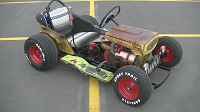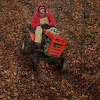|
| | Heat treating 101: The bake sale |  |
| | | Author | Message |
|---|
Lawren Wimberly
Established Member


2014 Build-Off Entrant
2014 Build-Off Entrant
Age : 57
Join date : 2013-12-21
Points : 4799
Posts : 744
Location : Salem Illinois
 |  Subject: Heat treating 101: The bake sale Subject: Heat treating 101: The bake sale  January 27th 2014, 2:11 pm January 27th 2014, 2:11 pm | |
| If Life's a box of chocolates, then heat treating is baking cookies for a bake sale. There is a specific recipe to follow for best results.
Knowing what type of steel you are using is important... The chemistry of the steel will change the baking instructions just as much as changing from chocolate chip to gingerbread will in the cookies analogy.
The methodology is simple... Heat to the correct temperature, gench, heat again to temper, and let cool.
The VARIABLES are temp, time, and what you quench in.
For the purposes of this guide, I'm going to give you a rule of thumb
recipe that will work for MOST steels. Keep in mind, that as with ANY "do it all" anything, it will not get the MOST out of any particular steel, but it will do passably for most simple carbon steels, and a lot of the alloy steels as well. This is intended as a beginners guide, I will go into all the techno geek chemistry and physics in a later, more advanced guidepost.
Step one: Normalizing
after you have finnished beating, twisting, bending, and grinding your steel into a roughly knife shaped object, the steel is chock full of highly stressed spots, kinda like lumps in gravy. heating and quenching with the steel in this state is likely to warp, break, or crack the blade. we want to get the steel nice and relaxed first, before we super stress it in the quench. to do this, we heat the steel to a nice even red, and let it cool back to a point that you can pick it up. straighten any warps or twists. Heat it back up to a dull red, and let it cool again. Straighten again. Continue to do this until the warping stops. Once the blade stays straight after normalizing, (that's what ya been doing, you just didnt know it), we are ready for the next step.
Step 2: Heat to critical
Here is a point of confusion among most beginners, and some even that have been doing it a while. You will hear "Heat it till a magnet wont stick to it and quench" Now this WILL harden a blade, but it will not convert most of the blade to martensite (the fandangled word for the good steel) To use our cookie analogy this is kinda like throwing all of the ingredients in a bowl and shoving it in the oven without mixing it. sure ther will be some bits of the resulting blob that will kinda resemble a Cookie...
When steel hits the critical temp (usually a color shade or two ABOVE non-magnetic) some truly interesting things happen... all of the carbon and other alloying agents begin to go into solution, like ingredients that were trapped in ice that is beginning to melt. It is important to give the steel time at that temperature to get all of the carbon and other stuff evenly distrubuted throughout.
So to recap step 2, heat to a shade or two above non-magnetic, hold at that color for 5-10 minutes, then... on to the next step
Step 3: The quench
Now that we have all of the alloying agents evenly distributed, we want to Flash Freeze them in that state. A light oil, like canola or mineral oil works well for most blade steels at a warm 120 to 130 degrees. Remove from the heat and immediately immerse the blade quickly into the quench medium, preferably point down (vertical). If you cannot go point down, go edge first. DO NOT SWISH IT AROUND. This will cause uneven cooling, making the blade warp at best, and break at worst. Once the blade has stopped boiling the oil around it, it's time for the final step.
Step 4: Temper Temper!
Temper is a word that is often misused, and poorly understood by most. Many folks believe that tempering is hardening of the blade. Older generations are likely to blame for this, as it was common in the past to call a tool or blades final hardness as it's "TEMPER" In that sense, Temper meant the entire heat treating process's final result. For our purposes, "Tempering" is used to soften the steel a little, while making it MUCH more resistant to breakage. The best overall way I have found to do this, on a beginner's budget, is to preheat a panfull of dry sand to 400 degree's in the oven (use a turkey thermometer, your oven display isn't usually too accurate)
Once you remove the blade from the quench, wipe off the oil, scuff the surface a bit with some sandpaper, and place it in the hot sand of the oven for an hour or two. Remove the blade from the sand, let cool enough that you can hold it in ungloved hands. Look at your scuff marks from the sandpaper... you should see a color anywhere from a dark straw to a brownish purple. Place the steel back in the sand, and cook it for anouther hour or two. once done, remove it and let it cool.
You have now made a blade that is hard and tough, and ready for finishing!
So, to sum up:
Normalize: heat to red, straighten, repeat till the blade stays straight when heated
Heat to critical: heat to a color shade or two above non-Magnetic, and hold for 5 to 10 minutes at that color.
Quench: Immediately fully immerse point or edge down in the quenchant till all boiling stops.
Temper: Place in 400 deg heated sand for an hour or two, let cool, then do it again.
Hope this helps.
PS
This was intended as a knife tutorial, but it applies to any carbon steel part, from springs to axles. The only thing that changes is the quench media and the temper temperature. | |
|   | | TheBeal
Veteran Member


Age : 30
Join date : 2013-06-06
Points : 5711
Posts : 1402
Location : Central PA
 | |   | | Thunderdivine
Veteran Member


Join date : 2012-12-21
Points : 6537
Posts : 2101
Location : Norway, Europe
 | |   | | Lawren Wimberly
Established Member


2014 Build-Off Entrant
2014 Build-Off Entrant
Age : 57
Join date : 2013-12-21
Points : 4799
Posts : 744
Location : Salem Illinois
 |  Subject: Re: Heat treating 101: The bake sale Subject: Re: Heat treating 101: The bake sale  January 27th 2014, 4:47 pm January 27th 2014, 4:47 pm | |
| Remember, this is not the end all be all of heat treating... it is intended to coach someone through basic heat treating... I'm a fair to middlin metallurgist, if you have any questions about a particular steel part, and how to heat treat it, just ask
| |
|   | | Doc Sprocket
Site VIP


2018 Build-Off Entrant
2018 Build-Off Entrant
2021 Winner of Winners
2021 Winner of Winners
1st Place Build-Off 2016
1st Place Build-Off Winner 2016
Age : 51
Join date : 2013-04-21
Points : 7312
Posts : 2914
Location : Ontario Canada
 | |   | | Moose
Established Member


Age : 35
Join date : 2014-01-12
Points : 4945
Posts : 919
Location : Defiance, Ohio
 |  Subject: Re: Heat treating 101: The bake sale Subject: Re: Heat treating 101: The bake sale  February 16th 2014, 7:00 pm February 16th 2014, 7:00 pm | |
| lets say I made a knife out of a file how far can I go with heat treating before it gets hard to sharpen/brittle? think they are like d2 or something *shrugs* was planning on throwing some clay along the top to give it that cool samurai look and stuff too maybe keep the tang soft too dont need it snapping and impaling my hand! | |
|   | | Lawren Wimberly
Established Member


2014 Build-Off Entrant
2014 Build-Off Entrant
Age : 57
Join date : 2013-12-21
Points : 4799
Posts : 744
Location : Salem Illinois
 |  Subject: Re: Heat treating 101: The bake sale Subject: Re: Heat treating 101: The bake sale  February 16th 2014, 8:52 pm February 16th 2014, 8:52 pm | |
| I think ya missed the point... No pun intended. You make the steel as hard as possible (your file is probably 1095 or something so close to it that it wont make much difference)
AFTER you have hardened it, you draw the temper out of the steel, making it softer, and tougher. HOW MUCH softer is a "dependent on application" deal.
Personally, I wouldn't temper a knife at less than 300 degrees for an hour after hardening. With W1, O1, 1095 and other simple steels with close to 1% carbon, this will give you a very hard but still somewhat brittle blade. Recommended temps are 400 to 600 degrees for an hour (600 is spring steel hardness)
I do 1095 at 450, gives an even 60 Rockwell hardness. Holds a good edge, but is easily sharpened, somewhat flexible but still stiff.
If you go with claying and interrupted water quenching for your temper line (like the samurai sword), you don't temper at all... the clay retains the heat long enough to temper the back (and whatever else is covered with clay)
I might mention that you are quite likely to crack several blades before you get the hang of that method | |
|   | | Moose
Established Member


Age : 35
Join date : 2014-01-12
Points : 4945
Posts : 919
Location : Defiance, Ohio
 | |   | | Creepycrawler
Established Member


2024 Build-Off Entrant
2024 Build-Off Entrant
Age : 37
Join date : 2013-07-02
Points : 5013
Posts : 731
Location : Logan Ohio
 |  Subject: Re: Heat treating 101: The bake sale Subject: Re: Heat treating 101: The bake sale  February 17th 2014, 11:45 am February 17th 2014, 11:45 am | |
| Excellent write up, thanks for taking the time to do that! Ive always wondered about heat treating, and the cookie analogy brought it all home. | |
|   | | Lawren Wimberly
Established Member


2014 Build-Off Entrant
2014 Build-Off Entrant
Age : 57
Join date : 2013-12-21
Points : 4799
Posts : 744
Location : Salem Illinois
 | |   | | Doc Sprocket
Site VIP


2018 Build-Off Entrant
2018 Build-Off Entrant
2021 Winner of Winners
2021 Winner of Winners
1st Place Build-Off 2016
1st Place Build-Off Winner 2016
Age : 51
Join date : 2013-04-21
Points : 7312
Posts : 2914
Location : Ontario Canada
 | |   | | Lawren Wimberly
Established Member


2014 Build-Off Entrant
2014 Build-Off Entrant
Age : 57
Join date : 2013-12-21
Points : 4799
Posts : 744
Location : Salem Illinois
 |  Subject: Re: Heat treating 101: The bake sale Subject: Re: Heat treating 101: The bake sale  February 17th 2014, 2:07 pm February 17th 2014, 2:07 pm | |
| Note: I am trying NOT to turn this into a knife thread only, if you guys have anything ELSE you would like to heat treat, speak up! Axles, Springs, Spindles, and other parts can benefit from heat treating as well, 'specially if you have heated them (welded gears, input shafts, PULLEYS.....) | |
|   | | Doc Sprocket
Site VIP


2018 Build-Off Entrant
2018 Build-Off Entrant
2021 Winner of Winners
2021 Winner of Winners
1st Place Build-Off 2016
1st Place Build-Off Winner 2016
Age : 51
Join date : 2013-04-21
Points : 7312
Posts : 2914
Location : Ontario Canada
 |  Subject: Re: Heat treating 101: The bake sale Subject: Re: Heat treating 101: The bake sale  February 17th 2014, 2:50 pm February 17th 2014, 2:50 pm | |
| Funny you oughta mention gears. This Yanmar I picked up has several mangled tranny gears. Some are so bad that I have no choice but to source replacement. I think I spotted one or two that I could fix by filling in missing chips with weld, and filing to shape. I can't help but think that some sort of post-surgery heat-treatment is in order. Thoughts?
| |
|   | | Lawren Wimberly
Established Member


2014 Build-Off Entrant
2014 Build-Off Entrant
Age : 57
Join date : 2013-12-21
Points : 4799
Posts : 744
Location : Salem Illinois
 |  Subject: Re: Heat treating 101: The bake sale Subject: Re: Heat treating 101: The bake sale  February 17th 2014, 3:00 pm February 17th 2014, 3:00 pm | |
| anneal them after welding, then re-heat treat. I'd quench them in oil afterward. the heat treating of the gears should help a LOT with wear resistance. be sure to use hard facing wire or rod when you weld. | |
|   | | Doc Sprocket
Site VIP


2018 Build-Off Entrant
2018 Build-Off Entrant
2021 Winner of Winners
2021 Winner of Winners
1st Place Build-Off 2016
1st Place Build-Off Winner 2016
Age : 51
Join date : 2013-04-21
Points : 7312
Posts : 2914
Location : Ontario Canada
 |  Subject: Re: Heat treating 101: The bake sale Subject: Re: Heat treating 101: The bake sale  February 17th 2014, 3:23 pm February 17th 2014, 3:23 pm | |
| Hmmm- I'll have to look into it. ATM, I just have the standard FCAW and GMAW Lincoln wires. When I reach that point, I sure would appreciate more details, and thanks for your help. I could manage basic case-hardening on my own, but that's about it. | |
|   | | Lawren Wimberly
Established Member


2014 Build-Off Entrant
2014 Build-Off Entrant
Age : 57
Join date : 2013-12-21
Points : 4799
Posts : 744
Location : Salem Illinois
 |  Subject: Re: Heat treating 101: The bake sale Subject: Re: Heat treating 101: The bake sale  February 17th 2014, 8:36 pm February 17th 2014, 8:36 pm | |
| any time brother. I think a lit of broken teeth come about from folks weldin then quenching in water. makes the teeth TOO hard
| |
|   | | Sponsored content
 | |   | | | | Heat treating 101: The bake sale |  |
|
Similar topics |  |
|
| | Permissions in this forum: | You cannot reply to topics in this forum
| |
| |
| | Who is online? | In total there are 8 users online :: 0 Registered, 0 Hidden and 8 Guests
None
Most users ever online was 412 on January 7th 2023, 7:59 am
|
|









